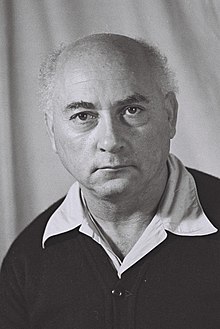Aharon Zisling
Aharon Zisling | |
|---|---|
 | |
| Ministerial roles | |
| 1948–1949 | Minister of Agriculture |
| Faction represented in the Knesset | |
| 1949–1954 | Mapam |
| 1954–1955 | Ahdut HaAvoda |
| Personal details | |
| Born | 26 February 1901 Minsk, Russian Empire |
| Died | 16 January 1964 (aged 62) |
Aharon Zisling,[a] also spelled Aharon Cizling, (26 February 1901 – 16 January 1964) was an Israeli politician and minister and a signatory of Israel's declaration of independence.[1]
Biography
[edit]
Born in Minsk in the Russian Empire (now in Belarus), Zisling emigrated to Palestine in 1904. He was among the founders of Youth Aliyah. As a member of the Haganah command, Zisling participated in the founding of the Palmach; he was a founder of the Ahdut HaAvoda party, a Jewish Agency delegate to the UN and a member of the Zionist Executive Committee.
Following Israel's declaration of independence in 1948, he was appointed Minister of Agriculture in David Ben-Gurion's provisional government. By then Ahdut HaAvoda had evolved into Mapam.
However, Zisling was a noted critic of Ben-Gurion's policies towards Palestinian Arabs, in particular plans to occupy abandoned villages and to destroy standing Arab crops throughout the country after the 1948 Arab-Israeli conflict.[2][3]
About the atrocities committed during the war, Zisling told the Provisional State Council (the forerunner to the Knesset), on 17 November 1948:[4]
"I couldn't sleep all night. I felt that things that were going on were hurting my soul, the soul of my family and all of us here (...) Now Jews too have behaved like Nazis and my entire being has been shaken." [5][6]
In 1949 he was elected to the first Knesset, but Mapam were not included in Ben-Gurion's coalition and Zisling lost his place in the cabinet. He was re-elected in 1951, and was part of the faction that broke away from Mapam to recreate Ahdut HaAvoda. He lost his seat in the 1955 elections and did not return to the Knesset.
Streets in Haifa, Ashdod and Be'er Sheva are named after him.
See also
[edit]References
[edit]- ^ Israel Ministry of Foreign Affairs. The Signatories of the Declaration of the Establishment of the State of Israel Archived 2014-07-20 at the Wayback Machine. 8 Jun 2003
- ^ Morris, Benny. Operation Dani and the Palestinian Exodus from Lydda and Ramle in 1948. Middle East Journal, vol. 40, n° 1 (Winter, 1986), pp. 82-109.
- ^ We put the Arabs on buses. By Yossi Melman. Haaretz, Feb. 11, 2005.
- ^ Speech given to the South African Parliament by Minister Ronnie Kasrils, MP, on the 40th anniversary of the Israeli occupation. June 6, 2007.
- ^ The expulsion of the Palestinians re-examined. By Dominique Vidal. Le Monde Diplomatique, December 1997
- ^ Tom Segev, 1949 - The First Israelis, Owl Books, 1998, p. 26.
External links
[edit]- Aharon Zisling on the Knesset website
- 1901 births
- 1964 deaths
- People from Minsk Governorate
- Belarusian Jews
- Jewish atheists
- Israeli atheists
- Emigrants from the Russian Empire to the Ottoman Empire
- Jews from Ottoman Palestine
- Jews from Mandatory Palestine
- Israeli people of Belarusian-Jewish descent
- Haganah members
- Ahdut HaAvoda politicians
- Mapam politicians
- Jewish National Council members
- Members of the Assembly of Representatives (Mandatory Palestine)
- Signatories of the Israeli Declaration of Independence
- Jewish socialists
- Members of the 1st Knesset (1949–1951)
- Members of the 2nd Knesset (1951–1955)
- Ministers of agriculture of Israel
- Israeli Ashkenazi Jews
- Immigrants of the Second Aliyah
